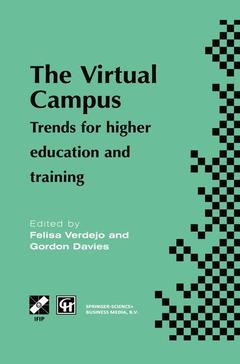Description
The Virtual Campus, 1998
Trends for higher education and training
IFIP Advances in Information and Communication Technology Series
Coordinators: Verdejo M.F., Davies Gordon
Language: English
Subject for The Virtual Campus:
Keywords
Collaborative Learning; E-Learning; Innovation; Internet; Multimedia; Processing; Text; WWW; Web; istance education; learning; organization
Publication date: 03-2013
308 p. · 15.5x23.5 cm · Paperback
308 p. · 15.5x23.5 cm · Paperback
Description
/li>Contents
/li>
The virtual campus: Trends for higher education and trainingwas the theme of the IFIP Working Conference on which this book is based. lt was a joint event of Working Groups 3.3 and 3.6, Research and distance Education respectively, of IFIP Technical Committee 3 for Education. International dissemination and promotion of cooperation are IFIP aims that we particularly wanted to address. This is why we opened the event to non WG members and have established a virtual forum on the WEB that has been widely visited. The programme for the 27 to 29 November 97 in Madrid included invited speakers from leading institutions in the field, reviewed and selected contributions from an open call for papers, on-site demonstrations of !arge European projects and discussion sessions involving distant and present participants. The event attracted experts from 23 countries. About a hundred persons were involved, from all over the world. The spread and accessibility of information and communication technologies are rapidly changing p!"actices in learning and research activities, both in professional and academic settings. The number, variety and scale of experiences reported in recent publications shows a growing international involvement concerning not only small groups of researchers but also institutions fully committed in that direction.
1 New wine and old bottles? Tele-learning, telematics and the University of Twente.- 2 Virtual learning centers for XXIst century organizations.- 3 New research avenues on multimedia based learning in the EU.- 4 Learning at a virtual campus: Deakin University’s experiences as a dual mode university.- 5 The university for industry pilot project.- 6 Introduction to global approaches.- 7 A Web-based learning environment: applying constructivist teaching concepts in virtual learning environments.- 8 An experience in UNED on building up a virtual campus.- 9 The impact of the Internet on academic research practices.- 10 Comparison of students’ thinking processes when studying with WWW, IMM, and text based materials.- 11 Collaboration between universities and enterprises in the knowledge age.- 12 Cultural contextualisation of learning with the World Wide Web.- 13 Questions and discussion.- 14 New approaches for collaborative learning and group activities.- 15 Towards a model of collaborative support for distance learners to perform joint tasks.- 16 Using the World Wide Web to promote educational discussion on university level courses.- 17 Distance education and distributed virtual environments.- 18 Self organised group activities supported by asynchronous structured conversations.- 19 Web tools and Web applications.- 20 How to distribute learning facilities by means of a network: some issues and a case study.- 21 A GCSE project for the distance evaluation of knowledge of French as a foreign language.- 22 Conceptual learning of sciences supported by Java compliant technologies.- 23 Extending Web educational applications via SGML structuring and content-based capabilities.- 24 SimulNet: virtual tele-laboratories over the Internet.- 25 A distance learning application based ona digital library of courseware.- 26 Authoring tools for network-based training.- 27 Using telematics to overcome educational constraints: teaching differential equations using the World-Wide-Web and multimedia technology.- Index of contributors.- Keyword index.
© 2024 LAVOISIER S.A.S.




